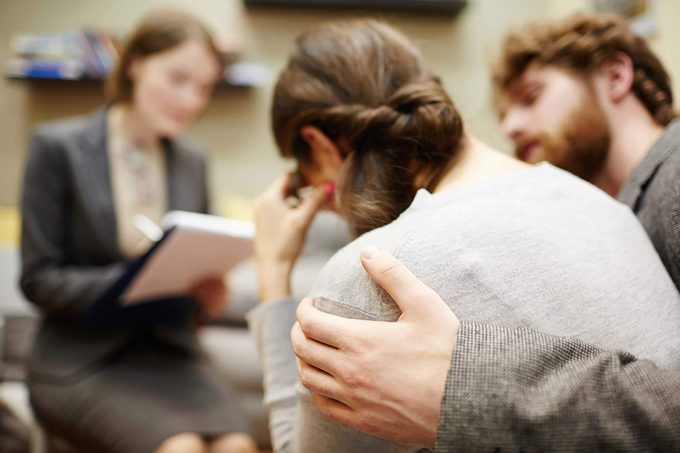5 Gentle Ways to Heal Emotionally After a Miscarriage
Updated: Mar. 29, 2021
While the physical healing can be over in hours or days, the emotional wounds may run deeper. Use these psychologist-approved coping mechanisms to help ease the grief.
Our editors and experts handpick every product we feature. We may earn a commission from your purchases.

Guilt is tough to avoid after a miscarriage, but even if you drank a margarita, went to hot yoga, dyed your hair, took a nine-hour plane ride, or busted your bum on the ice in your driveway, the miscarriage is most likely not your fault and could not have been prevented. Don’t believe the myths that can make the miscarriage even more painful. “There’s nothing you did or didn’t do that caused your miscarriage,” says Alice Domar, PhD, author of Conquering Infertility and executive director of the Domar Center for Mind-Body Health at Boston IVF. Keep in mind that miscarriage is incredibly common: For women in their 20s and 30s, 1 in 5 pregnancies ends during the first trimester; that ratio climbs to 1 in 4 for women 35 and older, and to 1 in 3 for women over 40. Don’t stress yourself out examining with a microscope every little thing you might have done to cause the miscarriage, but do talk to your healthcare provider to rule out medical problems, such as polycystic ovary syndrome or lupus.
State your needs
Don’t expect that you and your partner will cope with the loss the same way, especially if you miscarried during the first trimester. “You may have felt tired and nauseous and had swollen boobs, but the only change in his life is that his wife went to bed earlier,” Domar says. “He’s mourning the theory, but you’re mourning the actual physical loss of pregnancy.” So while your partner certainly wants to support you—and probably already shows you these signs of romantic trust—he (or she) may also want to watch the football game. Instead of being offended, tell him what you need from him, whether it’s to watch the kids and run errands while you have alone-time, give you a massage, or join you on the sofa for a movie marathon. Likewise, pay attention to your partner’s grief, too. Research shows men were vulnerable to despair and difficulty coping in the two months after the loss. (Here are some mourning quotes that might help you heal after a loss.)
Honor the experience
The Japanese have a Buddhist temple where women who’ve lost a pregnancy place a small statue of an infant (called a mizuko jizo) and wish it well on its journey, believing it will live at another time. In recent years, rabbis have begun developing Jewish ceremonies to acknowledge the lost life and ease the family’s sorrow. In an article in the journal Women and Therapy, Albuquerque, New Mexico Rabbi Deborah J. Brin confirms, “Creation and participation in a grief ritual can bring the grieving parents to a healing resolution.” Whether you hold a symbolic funeral with poems and prayers, compose a letter, make a charitable donation, plant a tree, release a balloon, or simply light a candle, ritual can help you make peace with the loss. Learn what the Day of the Dead can teach you about grieving the loss of a loved one.
Share the news
 Don’t hide your grief from family and friends. “The more people you tell, the more likely you are to find women who’ve also had miscarriages,” Domar says. “They can provide support, hear you out, and share with you how long it took for them to recover.” What’s more, going public with your experience can normalize it, helping remove any stigma or shame you may unconsciously be attaching to it. After all, you wouldn’t hesitate to tell friends you’d had a house fire, that your relationship ended, or that you were called back after a mammogram. Treat a miscarriage the same way and get the support you need. (Learn about more ways to cope with disenfranchised grief.)
Don’t hide your grief from family and friends. “The more people you tell, the more likely you are to find women who’ve also had miscarriages,” Domar says. “They can provide support, hear you out, and share with you how long it took for them to recover.” What’s more, going public with your experience can normalize it, helping remove any stigma or shame you may unconsciously be attaching to it. After all, you wouldn’t hesitate to tell friends you’d had a house fire, that your relationship ended, or that you were called back after a mammogram. Treat a miscarriage the same way and get the support you need. (Learn about more ways to cope with disenfranchised grief.)
Get tested
After one or two miscarriages, you may want to be screened for medical conditions that could jeopardize future pregnancies. (While not medical conditions, these everyday factors can also affect fertility.) Obstetrician-gynecologist Mary Stephenson, MD, director of the Recurrent Pregnancy Loss Program at University of Chicago Medical Center, recommends:
- TSH blood test to screen for thyroid disease
- Fasting blood sugar test for diabetes
- Pelvic exam and cervical culture to look for an infection, such as Chlamydia or bacterial vaginosis (BV). One study found that women with BV were nine times more likely to miscarry than their uninfected peers.
- Chromosomal analysis. Have the doctor send your miscarriage materials—the blood clots and tissue you passed, also called “products of conception”—to a lab for chromosomal testing. “If there’s an abnormal number of chromosomes then we know why the pregnancy stopped, and the risk of another miscarriage is not increased,” Stephenson says. “If we find that the chromosomes are normal, then we need to look for other factors, and there’s a greater risk of subsequent miscarriage.” If you’ve already had two or more miscarriages, talk to your healthcare provider about getting a complete medical evaluation to determine the cause.
